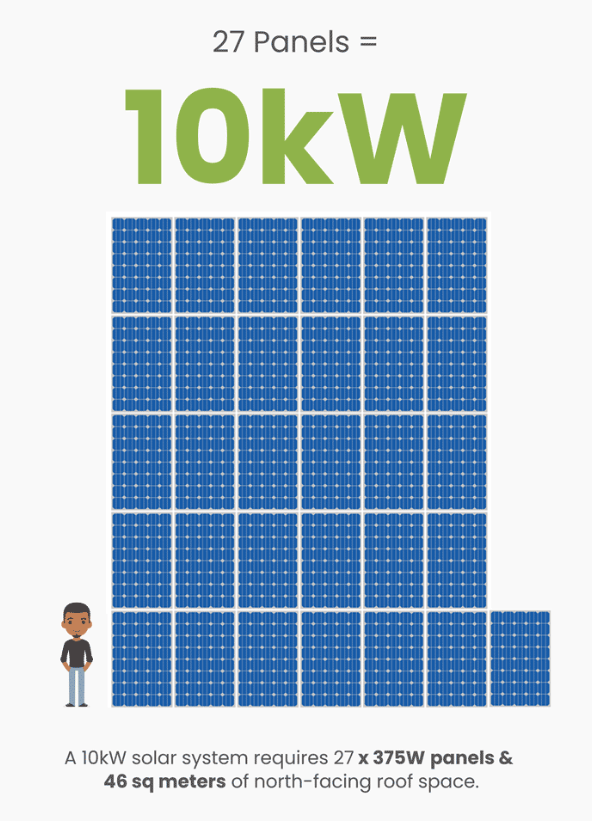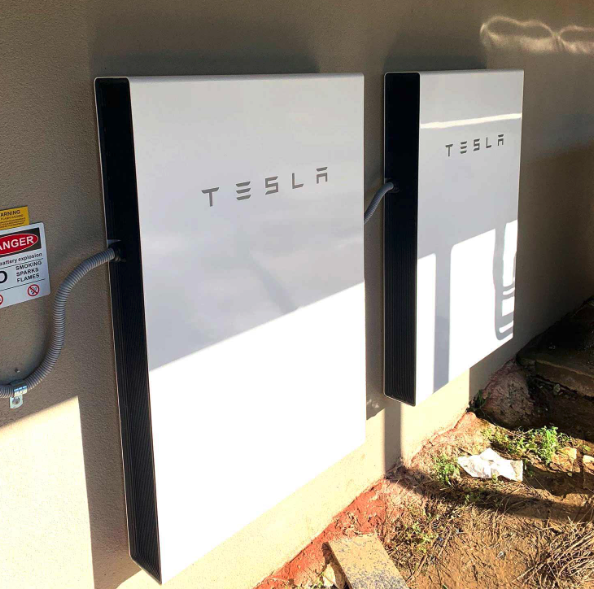Have you ever wondered how sunlight is used to produce electricity, well using solar panels we can collect sunlight, and convert it to electricity which is then ready for use? These Solar panels are panels containing solar or photovoltaic cells or modules that are placed in a sunlight area to capture the sun’s rays to be used as a source of energy which is then converted into electricity for personal use or distribution.
For a 10kw solar system it will need between 22 to 40 solar panels depending on their individual output. The solar panel number differs because different panels have different wattages outputs. This means that if the solar panels have higher wattage, you will need a smaller number of panels to reach 10,000 Watts (10kW). If the solar panels have lower wattage, then the number of solar panels needed will increase.
See below to calculate the number of panels you will need.

Why the number panels needed varies
- The output of a single panel will vary between 250W and 455W. To make up 10,000 Watts you will need 40 x 250W panels or 22 x 455W panels.
- Amount of sunlight; areas with little sunlight or shorter daytime require more solar panels spread over a large area to catch the most sunlight possible.
- Rooftop space; limited rooftops can be a problem when installing solar systems, especially in suburban. Houses with small rooftops are advised to go for high-wattage solar panels as they take up less space but provide substantial energy.
How do I calculate how many solar panels I need for a 10kw solar system?
To calculate the number of solar panels you will need for a 10kw solar system, use the following steps;
- Firstly, find out how much wattage of energy is required. You can request a paper bill from your power company and it will show how much energy is consumed monthly. Getting an idea of the annual energy usage is best because energy needs can vary from month to month.
- Secondly, find out how much sunlight the area of residence receives every month. The more sunlight the area receives, the more energy is produced.
- Find out the dimensions of your rooftop or the available space where the solar panels will be placed. Small space for solar panels means higher wattage solar panels will be the best option.
- For a 10kw solar system, if you use the average wattage solar panels which are approximately 370 watts. Then the number of solar panels needed will be;
10kw X 1000 = 10,000w
10,000w / 370 watt = 27 solar panels
This means that for a 10kw solar system using 370-watt solar panels, 27 solar panels will be required to fully charge the solar system. If your space cannot fit 27 solar panels, consider high-wattage solar panels.
How many batteries are needed for a 10kW solar system?
If you are looking to be fully self sufficient and dont want to rely on the feed-in tariffs, solar batteries are a great idea to store power for later use.
A 10kw solar system produces an average of 40 kilowatt hours every day. On average about 15kW will be used by the home during the day and the rest (28kW) will be used at night.
Two Tesla Powerwall batteries will get you most of the way with each rated at 13.5kW for a total of 27kW.

Is it better to have more solar panels or more solar batteries?
One of the biggest questions many homeowners ask is whether to purchase more solar panels or more batteries.
Solar vs Battery
| Solar panels | Solar batteries |
| Having more solar panels means increased exposure to sunlight and faster charging. | More solar batteries mean that even without sunlight, energy has been stored. |
| Solar panels cannot store the energy they collect. This means that without sunlight, there will be no electricity. | Since batteries can store solar energy, when there is no sunlight, the battery will be able to provide electricity to the household. |
| Solar panels need batteries to be used independently on other forms of electricity. | Having more batteries means that households can store electricity. This means that they can live off the grid and use solely solar energy. |
| If the number of solar panels is enough to meet the household energy requirements, there is no need for more. | More batteries mean more energy stored. So if the solar panels are maximized, increasing the number of batteries will ensure that all energy is stored and used efficiently. |
| Houses with limited space cannot use more solar panels. | Houses with limited space can opt for high-wattage solar panels and an increased number of batteries. |
From the comparison above, it is clear that having more batteries is more beneficial than having more solar panels. Batteries are now affordable with the increased rebates provided by the government so homeowners can take advantage of the offer.
Is it worth getting a 10kW solar system?
Solar power is increasingly becoming the preferred source of energy, especially in the western world. The 10kw solar system has also become a popular fixture bought by many homes but is it worth it?
A 10kw solar system will produce an estimated 13,000-kilowatt hours of electricity. It is important to note that this output will depend on the amount of sunlight in your area. However, a 10kw system is enough to cover an average household’s electricity needs and requirements.
The average household uses an average of 11,000-kilowatt hours annually. Getting a 10kw system means that the average household can live purely on the output of their solar system bringing their dependency on fossil fuels to a minimum. This alone makes the 10kw solar system worth the buy.
How much does the 10kW solar system cost?
If you are looking to purchase a 10kw solar panel system, the cost would be $8,000 to $11,000 depending on the state you reside in. Australian states offer different tax rebates for households that want to use solar power. This rebate subsidizes the cost of a 10kw solar system and makes it affordable to the general public.
Purchasing a 10kw solar system can also mean that you will be saving on your electricity bill. The amount saved can be upward of $1,000 annually depending on the household and the state of residence.
A 10kw solar system will begin to pay for itself after a few years (4 to 6 years) of installation. This is depending on the state of residence and the amount of sunlight, the solar system will start to pay for itself.
Australian households with a 10kw solar system also save about $2,000 to $3,500 annually in electric bills. This means that having a 10kw solar system is cost-effective and a good investment for many households that can afford it.
How much does a 10 kW solar system produce per day?
A 10kw solar system will produce approximately 40 to 55-kilowatt hours daily. However, the 10kw solar system will produce a total of about 13,000-kilowatt hours annually.
This output is an estimate and will depend mainly on the amount of sunlight in your area, how long daylight lasts etc. Regardless of this, the average of 47kwh daily is enough to meet a household’s energy requirements.
How long does it take to charge a 10kW battery?
The time required to charge a 10kw solar system depends on the power supply and the battery the household is using. For example, if the total sum of all the batteries connected to the 10kw solar system is 10-kilowatt hours and a 5kw power supply is available, it will take the solar system approximately 2 hours to be fully charged.
To find out how long your system requires divide the kilowatt per hour of the battery pack by the kilowatt of the power supply e.g. 10kwh/5kw = 2 hours.
What can I run on a 10kW solar system?
The 10kw solar system is one of the most significant household solar systems available. The solar system will require a lot of roof space, solar panels, and batteries to be able to work efficiently and store the energy efficiently.
A 10kw solar system will run an entire household including the appliances such as televisions, washing machines and dryers, central heating and air conditioning, water pumps, etc. the 10kw solar system along with all the appliances will also run all the lights in a 5 to 6 bedroom house.
This means that if you have a large house, a 10kw solar system will be enough to cover all your electricity needs. For those who live in a small home but want to go off-grid, getting a 10kw solar system will be enough for all your energy requirements and will produce enough extra output for storage.
